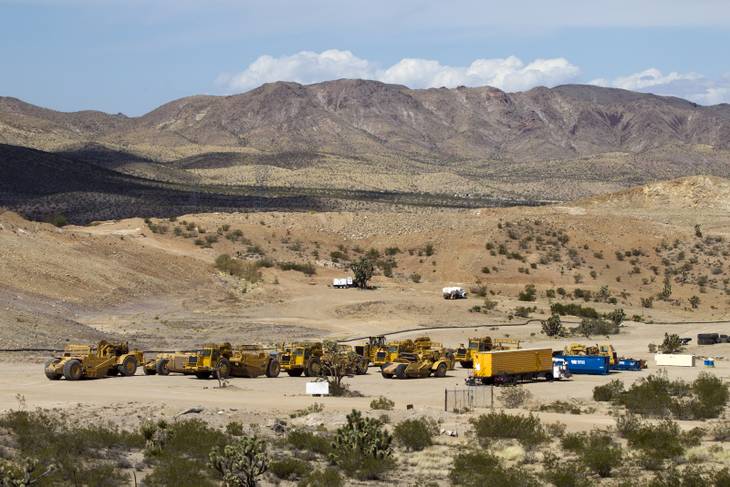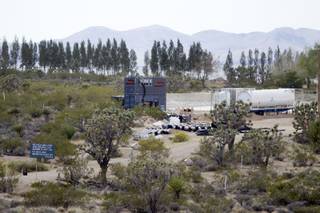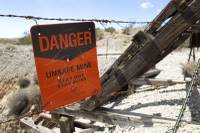SEARCHLIGHT — There are no grocery stores or doctor’s offices in this speck of a town outside Las Vegas. Most people live in mobile homes, and new suburban-style housing tracts have streets and utilities but, like a ghost town, few or no homes.
There are no major employers, and the only restaurants are McDonald’s and a small casino with 10-cent coffee. But a mile or so north of town, a small company is trying to resurrect the business that made Searchlight boom a century ago: gold.
Nevada Milling and Mining is working off U.S. 95 in the Opal Mountains to pull out the precious metal. The group has permits to explore the 52-acre Blossom Mine and the adjacent 38-acre Coyote Mine, state records show, and in June it bought 110 acres of nearby land from Senate Majority Leader Harry Reid, Searchlight’s most famous son. The $1.75 million deal included his house.
Searchlight has far more abandoned mines than active ones, and, despite the town’s tiny size, a checkered past of scams and failed ventures. But Nevada Milling is different, locals say. Whether or not the company strikes it rich, it’s making one of the first substantive efforts in years in a town that hasn’t had recorded gold production for decades.
The company, owned by investors in South Dakota and Michigan, holds a few hundred acres of land locally. It has an office in town and runs an active work site off the highway.
Nevada Milling planned to start with 40 employees and grow to as many as 60, and process minerals on-site into gold bars, according to Clark County records.
“They have put tons of money into the operation,” said town historian and longtime resident Jane Overy.
Mine manager John Hayes said his group aims to start production this year and will work the land for at least five years.
He would not disclose the company’s estimates of gold deposits. However, he does not expect to find a mother lode whose mining rights could potentially be sold for hundreds of millions of dollars to a larger company with the cash for large-scale excavation.
“As far as mines go, this is a pretty small one,” he said.
Searchlight has microscopic pieces of gold underground, not nuggets, Overy said. But, even though the town has been mined off and on since the turn of the 20th century, leaving the area pockmarked with holes, it’s always worth another look.
For one thing, miners don’t hack at hills with picks and shovels anymore. Companies use advanced mapping technology to find potential deposits; drill and blast underground to build mines; haul out ore and crush and grind it; mix the minerals with water and cyanide; and extract precious metals with electric currents.
Searchlight also has history on its side.
As the old mining adage goes, said Nevada Mining Association boss Tim Crowley: The best place to find minerals is where they’ve already been found.
• • •
It takes years of research, drilling and other work — requiring millions of dollars in capital — to even determine whether a site can be mined for gold, experts say. Investors have been setting up shop in Searchlight, but it seems no one has succeeded lately, at least not yet.
Henderson-based US Mining Corp. lists on its website projects at the once-lucrative Quartette Mine, the New Roman Mine east of town and the nearby Liberty Mine. New Roman and Liberty are in exploration and preliminary development stages, according to the website, which does not explicitly say what, if anything, is occurring at Quartette. CEO Scott McAdam did not return a call for comment.
Searchlight Minerals Corp. has had a gold project south of town. The Henderson company received federal approval in early 2010 to drill 18 holes, but to save cash, management postponed work here to pursue a project in Arizona, according to regulatory filings.
The company has no revenue, loses millions of dollars a year and recently allowed mining claims on federal land near Searchlight to lapse by declining to pay government maintenance fees. It did not return calls for comment.
Other plans for the area have flopped, as state records show a handful of inactive, abandoned or closed gold-mining projects, according to JoAnn Kittrell, spokeswoman for Nevada’s Department of Conservation and Natural Resources.
Scammers also have flocked to town. In 1998, purported mining company Phoenix Metals U.S.A. II held a ribbon-cutting ceremony at a refinery and claimed to have almost $3 billion in mineral ore deposits.
“Grow with Phoenix Metals — and Go For the Gold!” a brochure said.
In 2004, however, a federal grand jury indicted owners Diana Lee Flaherty and Michael Gardiner on fraud charges. Gardiner pleaded guilty to securities fraud and got three years' probation and a $10,000 fine. Flaherty, who ran the company with her late husband, Robert Flaherty, was convicted at trial and sentenced to 7 1/2 years in prison and three years' supervised release, and ordered to pay almost $5.8 million in penalties, court records show.
Overy, the historian, keeps a manila folder with newspaper clippings about local mining ventures and with “Gold Scams?” written on the tab. She’s seen a parade of would-be miners with empty promises and fizzled plans, but she’s impressed with Nevada Milling. Among other things, management has invited Overy to the mining site, worked with community groups and actually started heavy work.
“It’s not like that all the time,” Overy said.
• • •
Searchlight, an unincorporated pocket with just 539 residents as of 2010, is 60 miles south of Las Vegas. In 1898, locals formed the Searchlight Mining District to record mining claims. The town “began to boom” in 1902 and peaked in 1907 with about 1,500 residents, according to the Searchlight Historic Museum, as gold and silver miners streamed in.
But production soon fell. Miners fled for other boom towns, leaving just 50 residents in Searchlight by 1927. For years after, including through the 1950s, one of the biggest industries here was prostitution, with 13 brothels at one point, according to Reid’s book “Searchlight: The Camp That Didn’t Fail.” Reid’s mother even did laundry for the bordellos.
Overall, about $6 million in gold, silver and other minerals were pulled from the ground by the mid-1950s, according to state researchers, and there’s been practically nothing since.
“I don’t think there’s been anything (reported) in the last 40 years from Searchlight,” said John Muntean, an economic geologist with the Nevada Bureau of Mines and Geology.
Reminders of the boom years dot the town, with hulking equipment off the highway and black-and-orange “danger” signs warning of unsafe mines. Federal and state officials in recent years tallied 145 abandoned-mine hazards in Clark County, including a high-priority list of 30 in the Searchlight area, according to the Nevada Division of Minerals.
Nevada by far is the largest source of gold in the country, accounting for more than 75 percent of U.S. production. Most mines are in Northern Nevada, but there's still potential in Searchlight.
In recent years, geological mapping showed that the crust beneath Searchlight is tilted on its side, giving engineers a top-down view of cross-sections that may hold mineral deposits, said Nevada state geologist Jim Faulds, who worked on the mapping.
Although gold prices have dropped around 35 percent from their peak, they remain high. Gold is worth about $1,200 per ounce, down from $1,900 in 2011 but up from about $400 in fall 2004, according to Kitco Metals.
“It’s a real viable prospect,” Faulds said of Searchlight.
• • •
Nevada Milling’s project is a rare burst of new commerce in Searchlight, where aging commercial buildings line the main artery, U.S. 95, and more than a few trailer homes are in disrepair.
Recent attempts at nonmining ventures have fizzled. Some years ago, developers walled off land for a suburban-style housing project and pre-sold two dozen homes. But as property values soared during the real estate bubble, they returned buyers’ deposits and raised prices by $120,000 each, said Reggie Doing, whose family owns much of the town’s commercial property.
After the economy tanked, the site was seized through foreclosure. Just 13 homes were built, and there is far more empty land than developed.
South of town, developers started work on a 79-lot suburban housing tract adjacent to the local airport, which consists of a mile-long runway and some parking but no terminals or control tower. They paved roads and installed fire hydrants, electrical boxes and street signs, but they did not build a single house and lost the site to foreclosure. Now, street signs are knocked down, and the airport’s runway is cracked and overgrown with weeds.
The nearly 40-acre subdivision, along with a portion of the runway, is listed for sale at $795,000, broker Fred Marik said.
Meanwhile, Doing’s family listed their holdings with Marik for about $5 million in February 2013. That includes the Searchlight Nugget Casino, which they built in 1979 and has a 92-seat restaurant; the 21-room El Rey Motel; and a residential building known as the bunkhouse, which houses casino workers and used to be a brothel.
The Doings are rumored to have reached a deal to sell the casino to gas-station chain Terrible Herbst, which has a gas station and small casino and bar in Searchlight. Marik said he can’t confirm or deny the deal. Doing, who has said he’s under contract to sell the casino to a local buyer, did not return a call seeking comment on Terrible Herbst. That company also did not return a call for comment.
There have been few new job opportunities in Searchlight the past couple of decades, and Nevada Milling’s entry is good for the town, Doing said.
“I just hope they find some gold ... and keep it going for a very, very long period,” he said.



